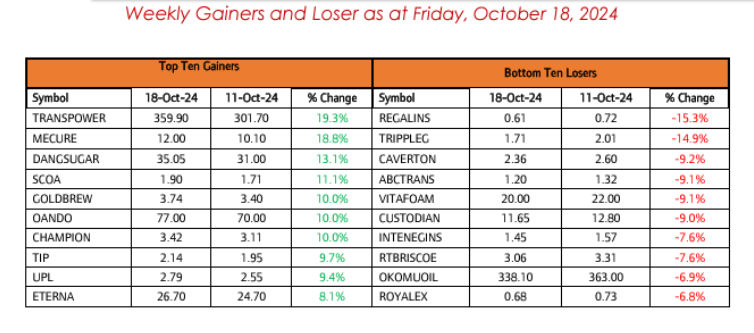Nigeria’s inflation surged 32.70% in September 2024, driven by flooding in key food-producing areas, rising fuel prices, and the Naira’s depreciation. Core inflation dropped slightly, while the Nigerian stock market maintained a positive trend despite economic pressures. Read for a more in-depth analysis of the week’s Nigerian and international economies and markets.
Japan’s core inflation slowed to 2.40% YoY in September 2024, marking the first decline in five months, primarily due to government subsidies on energy products. However, inflation (excluding energy costs) remained unchanged, reflecting price pressures in other sectors. The Bank of Japan (BOJ) is expected to maintain its current interest rate stance, with inflation likely to soften further as energy subsidies continue to weigh on prices.
China’s GDP grew 4.60% YoY in Q3 2024, but quarterly growth improved to 0.90% QoQ due to government stimulus measures. Retail sales and industrial production grew, boosting confidence in China, and meeting its GDP target.
Headline inflation in the UK fell to 1.70% YoY in September, and core inflation also declined to 3.20% YoY. The BOE is expected to be cautious due to uncertainties around the upcoming UK budget and its potential inflationary impact.
Nigerian Economy
Nigeria’s consumer price inflation has reversally increased to 32.70% in September 2024, marking the first increase in three months. This is due to flooding in vital food-producing regions and rising input costs driven by higher distribution expenses.
The depreciation of the Naira and significant rise in fuel prices have also contributed to increased costs across various items.
The monthly inflation rate stood at 2.52%, 0.30% higher than the 2.22% recorded in the previous month. Food inflation, which accounts for a significant portion of Nigeria’s inflation basket, rose sharply to 37.77% year-on-year in September from 37.52% in August. Increases in critical items such as guinea corn, rice, maize grains, beans, yam, water yam, cassava tuber, beer, tea, coffee, and vegetable oil caused this increase.
Imported food inflation continued its upward trend, driven by currency depreciation and its broader effects on the economy. Core inflation, which excludes volatile items like food and energy, marginally decreased to 27.43% in September from 27.53% in August.
Rents, intercity bus fares, taxi fares, meals at local restaurants, laboratory services, and medical consultations recorded the highest price increases. The twelve-month average annual inflation rate was 25.64% for the twelve months ending in September 2024, 6.09% higher than the 19.55% recorded in September 2023.
Money Market
The fixed-income secondary market experienced a bearish sentiment as average T-bills and bonds yields rose to 22.37% and 19.40%, respectively, from 21.27% to 19.40% and 18.84% in the previous week. The Nigerian Eurobond market showed minimal activity, with an average yield of 9.44%. Investor activity is expected to be modest next week.
Stock Market
The Nigerian Exchange (NGX) maintained its positive momentum this week despite macroeconomic headwinds, including the release of September’s inflation data. The All-Share Index (ASI) advanced 0.47% week-on-week to close at 98,070.23 points, driven by Aradel Holdings Plc’s listing.

The NGX market capitalization rose by 5.95% week-on-week to N59.43 trillion. Despite mixed sentiment, the year-to-date return stood at a solid 31.16%. Aradel’s listing of 4.34 billion shares at N702.69 per share injected fresh optimism into the market, reinforcing investor confidence and reinforcing the oil and gas sector’s participation in the equity market. However, trading activity showed signs of caution, with market momentum relatively weak in the face of lower traded volumes.
The weekly trade value uptrend was 134.5% week-on-week to N73.89 billion, while the traded volumes maintained another week of decline by 51.2% week-on-week to 1.45 billion shares. Across the sectoral front, performance was largely positive, with three out of five sectors tracked closing northward. The oil and gas sector benefitted significantly from Aradel’s entry, reinforcing investor confidence.
Conclusion
Nigeria’s headline inflation rate rose to 32.70% in September 2024 despite the Central Bank’s monetary tightening efforts. This rise was influenced by a surge in petroleum prices and the depreciation of the Naira. It is expected to continue rising to 33.10% in October. The increase is attributed to the recent rise in PMS prices and the ongoing impact of flooding in key food-producing areas.
As investors await additional Q3 earnings reports, the market mood is anticipated to stay high. Investors are encouraged to carefully realign their portfolios, concentrating on industries and businesses with promising growth and profit prospects, even in the face of continuous market dips and pullbacks.
Stocks such as OKOMUOIL, BUA CEMENT, GUINNESS, CONOIL, and GTCO may be considered good buys at this time.
Comment, Like 👍, share this article, and Follow us on our social media handles.








